
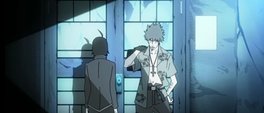


It is easy to fall in love with Bakemonogatari when looking at screenshots because for the most part, a collection of screenshots is all you receive with it - the most recent studio SHAFT / Akiyuki Shinbo series. If phrases were associated to anime, Bakemonogatari's would be "style over substance". So far does it take this maxim that it's difficult to describe any point where one feels connected or even mildly interested in the glossy puppets that fornicate with the bold colour palette.
from ice-queen cynicism to obnoxious trollop without missing a step
The story, as much as there is one, concerns Araragi who acts as a paranormal busy body for girls - ranging in age from barely legal to certainly illegal - suffering from a plethora of supernatural ailments. To aid him he regularly consults a destitute punk living in a derelict school with a outwardly pre-teen female vampire. The mythos and character back-stories are the sharpest part of the series and the afflictions suffered by the protagonists are certainly above the usual monster of the week fare, although this is perhaps thanks to the light novel source material than the anime adaptation. SHAFT and Shinbo plot their usual course and drench the series in faux abstract visuals - implying there is more meaning than is available and consequently presenting something vapid and soulless more than modern and engaging. Sudden cuts to single colour title cards start off as eccentric but quickly become a crutch to prop up the wildly varying production.
Read the rest of this entry


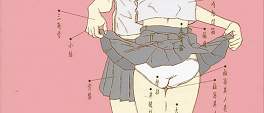
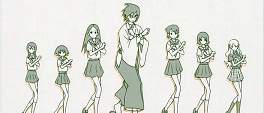
How would a studio approach a manga known for its wordplay and focusing on a depressively suicidal teacher, a manga that was notoriously (even infamously) claimed to be untranslatable? Surely even SHAFT, known for their off-the-wall adaptations of other, more straightforward manga such as Pani Poni and Negima, could manage such a feat? They did, and with such reckless disregard for obstacles such as plot, continuity and sanity; Sayonara Zetsubou Sensei is bizarre, satirical, cynical and rambunctious and solidifies SHAFT as a skilled and confident studio.
each episode is a scatter-shot of styles and content, the speed and veracity of each bite-size skit causes as much humour as the subject matter
Describing the premise of the series would never be enough to encapsulate what it is actually about: the histrionically pessimistic Itoshki Nozomu is at thwarted in his attempts to kill himself by the outwardly naive and interminably optimistic Kafuka. This satisfies the first twelve minutes of the series as it then goes on a journey involving stalkers, hikkikomori, escape routes and courting rituals but most of the time it concerns itself with nothing in particular: a multicoloured collage of gags, perceptions on life and randomness. Sayonara Zetsubou Sensei has very little to say and has a damn good time saying it. The series doesn't cover a specific time frame or tell a coherent story, it is a staccato whimsy of wordplay and wonder; a möbius strip of pop-culture references and banter on the thralls of modern existence. If all this sounds like the series occupies a different existence to the rest of the world, you wouldn't be far off the mark. An episode can focus on one specific topic, often meandering along the way, veering off on tangents of logic but ultimately digging through an obscure subject such as what can be accepted as minimal culture, or clearing away impurities or escaping from blame and responsibilities. Other episodes which make up the majority of the twelve episode barrage concern themselves with frittering away on whatever shiny issue takes its fancy, the opening episodes concern themselves with introducing the core set characters and their associated archetypal personality quirks then strobing fanservice, insults, family members and all points in between. Episodes are sometimes over before one knows it, other times the closing animation can be just a punctuation mark before it continues, seemingly unabated.
Read the rest of this entry
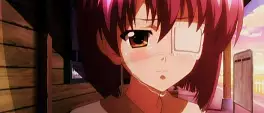


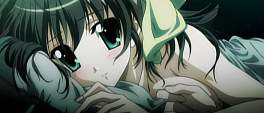
Given such an auspicious and confusing opening three episodes, it would have been easy for ef to fall into obscurity and abstraction with deep symbolism and obscured plot; thankfully this is not the case and the series manages to make the absurdly stylistic symbolism part of itself while still a sometimes unique, not wholly original story which ends well at a petite twelve episodes.
the grayscale visions of Hiro, the stained glass technicolour of Chihiro and the sunset beaches for everyone
In between the astounding opening and changing ending are two stories: one about a high school boy trying to find colour in his world while trying to deal with the affections of two girls, one overt and another covert; the other is about a girl whose memory lasts only a scant thirteen hours before events begin slipping away and her relationship with a boy she meets at an abandoned train station. The plot may sound akin to an atypical dating-sim territory but the storytelling is first rate and deftly draws one into the world and its characters. The supernatural elements that nagged the opening episodes are present but downplayed; the ephemeral figure of a long haired woman who imparts advice to all of the central characters and then vanishes is never explained even slightly, the same with the silent, world weary caretaker of the memory-challenged protagonist. The only time these elements are brought to the fore is in the final moments of the series, hinting more at a desire for a second season rather than anything that would affect the first.
Read the rest of this entry




With signature aplomb, SHAFT take up art-duties with ef - a tale of memories and craft a typically stylish and coy introduction to an intriguing and melodramatic series. Long shadows and open skies, stark lines and silhouetted profiles, the art direction obscures the sedate story and mundane characters but the potential for things much greater is too enticing to pass up.
the characters [...] are sometimes infuriatingly obtuse, communicating through enigmatic monologues or understated emotions
ef - a tale of memories pitches itself somewhere in between school drama and supernatural, School Days and Sola; it has the straight faced drama of School Days but more playful, with the fantasy hints of Sola except less blatant. The first episode can best be described as confusing: cutting back and forth between full colour, grayscale, black and white and all points in between seemingly at random then leaping forwards or backwards through time with nary a keystone to right oneself. It conjures up thoughts of Soultaker and the premise being the weirdness rather than coherence; thankfully these thoughts are allayed in the second and third episodes which deftly sculpt the story, rarely allowing itself to be pre-empted by the viewer. It doesn't so much tone-down the oddness as spread it more thinly. The abandon shown for chronology is more telling as certain characters and traits are in one arc and not the other, wordlessly foreshadowing momentous events on the horizon.
Read the rest of this entry















